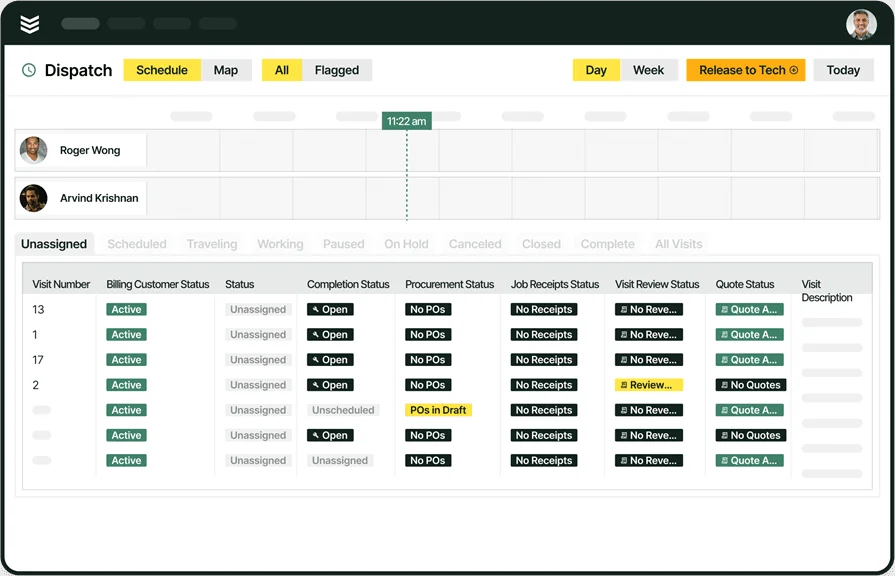Key Takeaways
- Small businesses have unique needs for field service software, and need to focus on core features that bring the most value
- Top field service management solutions for small businesses include BuildOps (for commercial), Housecall Pro (for residential), and Jobber (for general contractors)
- Bring our list of 10 questions to ask vendors to your demos to make sure they’re prioritizing your small business needs
When you're running a small business, every job counts. You don’t have extra office staff to handle scheduling hiccups, follow up on invoices, or chase down technicians for job updates. That’s why the right field service management software isn’t just helpful—it’s essential. It keeps your operation lean by automating job scheduling, tracking invoices, and keeping your team connected in the field.
This guide covers everything you need to know to find the best FSM software for your small business, including:
- 6 key features to look for in small business field service management software
- 7 best field service management software for different types of small businesses
- 5 benefits of using a field service management software for your small business
- How to choose the right field service management software for a small business
- 10 questions to ask vendors in a demo for small field service businesses
- 4 important small business field management software FAQs answered
Let’s start with the key features that are important to small businesses when it comes to field service software.
6 key features to look for in small business field service management software
Small businesses don’t have the luxury of extra office staff or deep pockets for inefficiencies. Every job, invoice, and customer interaction needs to be handled smoothly to keep things profitable.
A field service management software can help small businesses stay organized, cut down on admin work, and improve service quality. Here are the six key features we see making the biggest for smaller teams:
1. Scheduling & dispatching
With a smaller team size, getting scheduling and dispatching right is critical, but shouldn’t cause daily headaches. Drag-and-drop schedulers, the ability to easily update schedules when emergency or urgent work comes up, and a central location where all techs can access their schedule as it's updated are all things you should be looking for.
Some more advanced features include AI-powered field scheduling software that can make suggestions to your schedule to optimize it. Things like route optimization that makes better use of techs already out on the job, or assignments based on technician skills are all nice things to have as well.
2. CRM and lead pipeline management
A fully integrated CRM helps techs instantly pull up past repairs, warranty details, and notes from the last job, so they arrive fully prepared. A CRM system designed for small business contractors keeps customer records organized and ensures every tech has access to job history, leading to faster service and better relationships.
Field service CRMs can also sort leads by their intent, and even provide pipeline insights in your local area about who is looking for work, helping you prepare your quotes and later follow up with the best opportunities.
3. Built-in invoicing & payments
Keeping cash flow steady is especially important to smaller businesses, and FSM software with built-in invoicing lets techs generate invoices on-site, accept digital payments, and even send automated reminders for overdue balances. Automated invoicing reduces late payments and eliminates billing headaches.
4. Customizable reporting & analytics
Many small business owners rely on gut instinct to make decisions, but field software with reporting and analytics for your crew’s work provides real data you can take action with. You can track key field service metrics like job completion times, revenue per technician, and service profitability, making it easier to adjust training or scheduling as needed.
Tools like BuildOps field service reporting offer you the ability to build a custom reporting using literally any field you want from the tool, meaning you can build dashboards that actually work for your team, and aren’t just the cookie cutter solution all other field businesses are using.
5. Mobile access for field technicians
A small business crew is rarely sitting in the office, so techs need job details, customer history, and work order updates on their phones. With software that offers a field technician mobile app, your workers can pull up service rates, create quotes on-site, and even schedule jobs—all from their phone.
On smaller crews, most team members end up covering larger roles, so this is an important feature that keeps small teams connected without constant office check-ins.
6. Inventory & equipment tracking
Small businesses can’t afford to waste money on lost tools or over-ordering materials. With FSM software, every part is logged, assigned to jobs, and accounted for—so they only order what’s actually needed. Inventory tracking management software helps businesses prevent shortages, control costs, and ensure materials are managed efficiently.
Other valuable field service management software features for small businesses
While core features like scheduling, CRM, and invoicing are essential, some additional tools can give small businesses an extra edge. These features may not be must-haves, but they can improve efficiency, boost customer satisfaction, and make day-to-day operations run even smoother.
- GPS Tracking – Keeping track of technicians in the field helps small businesses optimize routes, reduce fuel costs, and provide customers with accurate arrival times. A locksmith company handling emergency lockouts, for example, can use GPS tracking to dispatch the closest technician, cutting down response time and improving service.
- Automated Customer Notifications – Sending appointment reminders, job status updates, and follow-ups automatically reduces no-shows and keeps customers informed. An HVAC business can notify customers when a technician is en route, ensuring homeowners are prepared and reducing time wasted on rescheduled visits.
- Photo & Document Attachments – Allowing technicians to upload job site photos and reports directly into the system improves record-keeping and reduces disputes. A solar panel installation company can document completed work and share before-and-after images with clients, ensuring transparency and trust.
7 best field service management software for different types of small businesses
The right tool for your small business crew depends on what type of work you provide to your customers. Check out our top choices that are organized by different business types.
1. Best for commercial small business teams: BuildOps
BuildOps is designed specifically for commercial contractors, offering an all-in-one platform for scheduling, dispatching, invoicing, and reporting. It helps small businesses manage complex projects while keeping field teams and office staff in sync.
Just because you have a small team, it doesn’t mean you need a basic tool. Most field service management tools for small businesses think that means you must focus on residential services (small projects), but we know that’s not the case. BuildOps is tailored for the demands of commercial work, handling large-scale jobs, service contracts, and asset management with ease.
How Pricing Works: BuildOps offers pricing on a per-company basis, ensuring that smaller businesses only pay for the tools they actually need.
What Sets It Apart for Commercial: BuildOps provides advanced job costing, project tracking, and multi-location service management—features that most small business FSM tools lack for commercial contractors.
Rating: 4.5 on Capterra from 149 user reviews
Set up a demo with BuildOps today, or check out our 5-minute walkthrough of how BuildOps works right now:
2. Best for small residential contractors: Housecall Pro
Image Source: Housecall Pro
Housecall Pro is a strong choice for small businesses specializing in residential services like HVAC, plumbing, and electrical work. It offers easy job scheduling, automated customer communication, and payment processing. However, it may not be the best fit for businesses that require more advanced job costing or scaling commercial service management.
How Pricing Works: Housecall Pro offers tiered pricing, with basic plans covering scheduling and invoicing, while premium options include advanced reporting and automation tools.
What Sets It Apart for Residential Services: Housecall Pro excels in customer communication, offering automated appointment reminders, online booking, and a client self-service portal.
Rating: 4.7 on Capterra from 2736 user reviews
Want to explore more? Take a look at Housecall Pro’s Features to see if it fits the needs of small residential contractors, or check out our head-to-head comparison of HousecallPro vs BuildOps.
3. Best for general contractors: Jobber
Image Source: Jobber
Jobber is a versatile FSM platform designed for general contractors who handle a mix of service calls, installations, and maintenance work. It offers job scheduling, customer management, and invoicing tools in an easy-to-use interface. However, it may not be the best choice for businesses that require advanced project tracking and scaling commercial service management.
How Pricing Works: Jobber provides multiple pricing tiers, starting with basic scheduling and invoicing features, while higher plans include automation and reporting tools.
What Sets It Apart for General Contractors: Jobber simplifies client communication with automated follow-ups and allows contractors to track job progress with a mobile-friendly dashboard.
Rating: 4.6 on Capterra from 1404 user reviews
Check out Jobber’s FSM Software to learn how they help general contractors.
4. Best for lead management: Workiz
Image Source: Workiz
Workiz is a great choice for small businesses that rely heavily on inbound leads and sales-driven service appointments, such as locksmiths, cleaning services, and appliance repair businesses. It integrates lead tracking, call management, and automated follow-ups to help businesses convert inquiries into booked jobs. However, it may lack some of the advanced operational features that contractors with long-term projects require.
How Pricing Works: Workiz offers subscription-based pricing, with plans that scale based on the number of users and included features.
What Sets It Apart for Lead Management: The built-in call tracking and lead automation tools help businesses respond to inquiries faster, reducing missed opportunities.
Looking to improve your lead tracking? See how Workiz lead management software can help.
Rating: 4.4 on Capterra from 218 user reviews
5. Best for scalability: Service Fusion
Image Source: Service Fusion
Service Fusion is designed for small businesses looking to scale without overcomplicating operations. It offers features like job scheduling, GPS tracking, and invoicing while maintaining a user-friendly interface. Unlike more complex platforms, it provides growing businesses with the tools they need without requiring a steep learning curve or enterprise-level pricing.
How Pricing Works: Service Fusion offers flat-rate pricing with no per-user fees, making it a cost-effective option for businesses planning to expand their team.
What Sets It Apart for Scalability: The combination of unlimited users, cloud-based access, and integration with QuickBooks makes it a solid choice for businesses preparing to scale.
Rating: 4.3 on Capterra from 287 user reviews
Expanding your business? See if Service Fusion’s field service management software fits your growth needs.
6. Best for ease of use: Kickserv
Image Source: Kickserv
Kickserv is designed for small businesses that want an easy-to-use FSM solution without a steep learning curve. It offers scheduling, invoicing, and customer management in a simple, intuitive interface. While great for small teams, it may lack some of the advanced reporting and automation features that larger businesses require.
How Pricing Works: Kickserv offers a free plan for solo operators, with paid plans that add more users and advanced features like automated follow-ups and job costing.
What Sets It Apart for Ease of Use: Kickserv’s drag-and-drop scheduling and mobile-friendly interface make it easy for field teams to update job statuses and invoices on the go.
Rating: 4.4 on Capterra from 386 user reviews
Looking for a straightforward FSM solution? See if Kickserv’s software is easy enough to use for your business.
7. Best for scheduling & dispatching: Service Autopilot
Image Source: Service Autopilot
Service Autopilot is built for businesses that rely heavily on efficient scheduling and dispatching, such as landscaping, cleaning services, and home maintenance companies. It automates job assignments, optimizes technician routes, and integrates with GPS tracking. However, businesses needing more in-depth commercial project tracking might find it limited.
How Pricing Works: Service Autopilot uses a tiered pricing model, with higher plans offering advanced automation, CRM tools, and route optimization features.
What Sets It Apart for Scheduling & Dispatching: The system automatically assigns jobs based on technician availability, location, and skillset, reducing downtime and maximizing efficiency.
Rating: 4.1 on Capterra from 139 user reviews
Need better scheduling and dispatching? Take a look at Service Autopilot’s software to see what it offers.
5 benefits of using a field service management software for your small business
Here’s are the main ways you stand to see some immediate ROI on your investment in a small business field service management software:
1. Fewer scheduling mistakes and missed appointments
Last-minute cancellations and double bookings can throw off an entire day’s work. A small HVAC business with only three technicians can’t afford to have one sitting idle because of a scheduling mix-up.
FSM software automatically syncs job assignments, prevents overlaps, and sends automated reminders to both customers and technicians. With real-time updates, rescheduling a job or filling last-minute openings becomes a simple task, keeping the workflow uninterrupted.
2. Faster invoicing and payments
Chasing down payments can be a headache, especially for small businesses that rely on steady cash flow. A plumbing contractor who completes an emergency pipe repair shouldn’t have to wait weeks for a check in the mail.
FSM software allows technicians to generate and send invoices on-site, giving customers the option to pay instantly through credit cards or digital payments. This eliminates billing delays and improves cash flow, ensuring that small businesses get paid on time.
3. Better communication between office and field teams
Miscommunication leads to wasted time and frustrated customers. A small electrical service company, for example, might dispatch a technician for a breaker panel replacement—only for the tech to arrive without the right parts because the job details weren’t updated.
FSM software bridges the gap between the office and field teams by providing real-time job updates, customer history, and work orders directly through a mobile app. This ensures every tech arrives fully prepared, cutting down on wasted trips and improving job efficiency.
4. Improved customer satisfaction and retention
Small businesses thrive on repeat customers and word-of-mouth referrals. A pest control company that doesn’t follow up on past treatments risks losing clients to competitors.
FSM software automates follow-ups, sends appointment reminders, and allows businesses to keep track of service history—all in one place. When customers receive timely updates and seamless service, they’re more likely to return and recommend your business to others.
5. More efficient job tracking and reporting
Knowing which services bring in the most revenue helps small businesses make better decisions. A refrigeration repair company might suspect that emergency calls are more profitable than routine maintenance, but without proper tracking, they’re just guessing.
FSM software provides detailed reporting on job types, technician efficiency, and revenue breakdowns, giving business owners the data they need to adjust pricing, allocate resources, and plan for growth.
Deep Dive
Need to learn how to optimize your field service management process for small businesses? Check out our complete guide to field service management for actionable steps you can take today to start seeing efficiency improvements tomorrow.
How to choose the right field service management software for a small business
Small businesses don’t have endless budgets or IT teams to troubleshoot complex systems. You need software that works out of the box, and has a full suite of field service tools built in to keep jobs organized, helping you run a tighter, more profitable business.
Here’s what to consider before making a decision:
- Ease of Use – Small businesses don’t have time for complicated software. With fewer resources and limited staff, the system you choose needs to be intuitive and quick to learn. Can your technicians access schedules, job details, and customer info easily, or will it slow them down and lead to wasted time?
- Scalability – Growing a small business means taking on more jobs and customers without overhauling your entire system. FSM software should allow you to add new users and expand features as your team grows—without expensive upgrades or complicated processes. Will it grow with you or hold you back?
- Automation & Efficiency – Small business owners often handle multiple roles, which makes minimizing manual work essential. Look for FSM software that automates scheduling, invoices, and customer updates. The less time spent on paperwork, the more time you have to focus on serving customers and growing the business.
- Mobile Accessibility – Small business teams are usually out in the field, not sitting in an office. Your FSM software should give technicians full access to job details, payments, and updates right from their phones—no need to call the office. Is the system truly built for mobile use, or just a desktop tool crammed into a mobile app?
- Features – When running a small business, you can’t afford to pay for features you’ll never use. FSM software should simplify core tasks like scheduling, dispatching, invoicing, and reporting—without overwhelming your team with unnecessary tools. Does it offer the features that match your needs today, with flexibility for tomorrow?
10 questions to ask vendors in a demo for small field service businesses
When you get to the point of setting up demos with your top options, make sure you bring these questions to the demo, so you aren’t oversold on features you don’t need, while missing the core tools that are going to help your team scale.
- If your team scales up, how are costs going to go up? Don’t get sold on an intro price that caps out at 5 team members. Make sure you understand what the future of pricing looks like going in.
- What are features included in the base price and what are add-ons? See if there’s room for customization so you can pick and choose the features you need most, possibly lowering costs.
- Can you see live proof of the features you care about most in the demo? Sometimes field service companies claim features are “in development” or “coming soon”, but they don’t really have any intention of prioritizing them. This doesn’t work for smaller teams who need what they need right now, and don’t have the luxury of waiting to scale. Make sure they show you proof of the key features you care about the most, live on the call.
- Does this tool suit the scale of the type of work you do (commercial or residential), and not just your team size? A tool may be built for small businesses, but that doesn’t always mean the scale of your work is small. If you’re a commercial team, are you getting the necessary features to complete large-scale projects?
- Are there any upfront added costs? Sometimes vendors will charge you onboarding or training fees. These aren’t really suitable for small businesses, so make sure you’re aware of any fees like this before you start implementation.
- Will they provide onboarding training for your team? With small businesses, it’s essential you get everyone on board and fully adopted to using the software. Make sure the vendor offers resources and training for this to get your custom workflows built and set up in the tool so you don’t need to halt work.
- Does the tool suit your specific industry? If you’re in HVAC/mechanical, electrical, plumbing, fire and life safety — or something else — make sure the features in this tool are suited to the type of work your crew does.
- Does it integrate with any other tools I need to keep using? If there are important tools you need to keep using (like Quickbooks for example), will this tool integrate with that? Make sure they show you how on the demo.
- How are they going to support you through onboarding? Are they going to make the sale and then you’re on your own? Will you have a dedicated specialist assigned to your crew until you get up and running? BuildOps even has a VP of Implementation because we know this is so critically important to field businesses. What are they going to do for you?
- What kind of commitment is there to the software once you start paying? Make sure you don’t get locked into long-term contracts that aren’t going to work for your team if it continues to scale, and there’s some flexibility and options for you if you determine the tool isn’t the right fit for you.
Deep Dive
If you’re shopping around for field service management software, we have a complete guide on how to compare your options, what questions to ask in a demo, what affects the price of software most, and how to weed out companies that are looking to sell you software and then bail without helping you through implementation.
Read up on our tips for field service management software comparison shopping before you start looking at options.
4 important small business field management software FAQs answered
If you still have questions about small business field service management software, here are the answers.
1. What is unique about field service management software built for small businesses?
When built for small businesses specifically, field service management software prioritizes ease of use, mobile access, and automation to handle daily tasks without extra admin staff. Usually the vendors will offer a smaller scale plan that might not have a huge catalogue of features, but are focused more on the key aspects of field service that smaller teams benefit from the most.
Unlike enterprise tools built for large-scale operations, small businesses need features that simplify scheduling, invoicing, and real-time job tracking. An enterprise-built tool might also include things like fleet management, AI-powered tools, CRM & pipeline management, among other things.
2. How much does small business field service management software cost?
Small business field service management software pricing varies based on business size and scope of features. Most FSM software offers tiered pricing, with very basic plans starting at $30-$50 per month, while more advanced plans with automation and reporting range from $100-$300 per person, per month.
Some field service softwares charge per user, while others may provide flat-rate pricing. Some also come with integration fees, or charge you for add-on features in addition to your base plan.
3. Is field service management software worth the cost for small businesses on tight budgets?
Most small businesses think field service management software is worth the cost for them. Small businesses often have the hardest time investing in software because they don’t have time to waste when it comes to seeing ROI. But the continued wasted time, wasted internal resources, and errors that keep leading to overages often cost more than the cost per person for field service software for a smaller team.
Did you know
BuildOps customers would certainly say so. When Omnia Mechanical Group cut their chaos by using BuildOps, they reduced their accounts receivable period by 75% down to just 30 days. When JL Minter Inc. added BuildOps, they saw similar results, slashing their billing time by 73%.
Check out their stories to see how your small business can see big changes like that.
4. What types of small businesses need field service management software?
Small business FSM software is essential for service-based businesses that manage appointments and field teams. This includes HVAC, plumbing, electrical, pest control, landscaping, appliance repair, and cleaning services. Any small business that schedules jobs, dispatches technicians, or collects payments on-site can benefit from integrating a small business field service management software.
Finding the right field service management software can transform how small businesses operate—streamlining scheduling, improving communication, and ensuring faster payments. While many field management tools offer basic features, not all provide the full suite of automation, reporting, and scalability that growing businesses need.
That’s where BuildOps stands out. Unlike other solutions that may lack advanced job costing, commercial service management, or real-time field updates, BuildOps brings everything together in one powerful platform. From scheduling and invoicing to reporting and CRM, it’s designed to help small businesses stay efficient, profitable, and ahead of the competition.

See if BuildOps is a good fit for your crew
BuildOps helps small businesses run a tighter, more profitable operation






